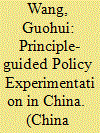| Srl | Item |
| 1 |
ID:
164411


|
|
|
|
|
| Summary/Abstract |
The abolition of Agricultural Tax in 2005 was a major policy of the early Hu–Wen administration. But how and why did it happen? Drawing on abundant media reports, archive documents and internal speeches by key policymakers, as well as on the author's interviews, this article argues that this reform was pushed through (the “how”) by “principle-guided policy experimentation” with origins in the period of Jiang Zemin's leadership. Not only does this show policy continuities from the Jiang–Zhu era into the Hu–Wen period, it also reveals a different process of policy experimentation from that identified by Sebastian Heilmann in the economic policy arena. Under principle-guided policy experimentation, Chinese central decision makers first reached consensus on the principle of the Rural Tax and Fee Reform (RTFR) drawing on policy learning from prior bottom-up local experimentation, and then formulated and implemented an experimental programme from the top-down, funding it in order to encourage local governments to participate. The evidence suggests that international, political (rural instability), economic and fiscal considerations came to explain leaders’ decisions (the “why”) on tax reform as much as their individual preferences.
|
|
|
|
|
|
|
|
|
|
|
|
|
|
|
|
| 2 |
ID:
151459


|
|
|
|
|
| Summary/Abstract |
Recent research on authoritarian regimes argues that they provide public goods in order to prevent rebellion. This essay shows that the ‘threat of rebellion’ alone cannot explain Chinese party-state policies to extend public goods to rural residents in the first decade of the twenty-first century. Drawing on theories of policy making, it argues that China’s one-party regime extended public goods to the rural population under the influence of ideas and policy options generated by policy communities of officials, researchers, international organisations and other actors. The party-state centre adopted and implemented these ideas and policy options when they provided solutions to external shocks and supported economic development goals. Explanations of policies and their outcomes in authoritarian political systems need to include not only ‘dictators’ but also other actors, and the ideas they generate.
|
|
|
|
|
|
|
|
|
|
|
|
|
|
|
|